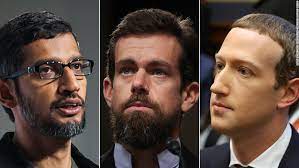Congress is set to grill the chief executives of Facebook, Google and Twitter about misinformation and online extremism on Thursday,
In the executives' first appearance before lawmakers since the Jan. 6 Capitol riots and the rollout of the coronavirus vaccine.
Members of the House Energy and Commerce Committee are expected to press Facebook CEO Mark Zuckerberg, Google CEO Sundar Pichai and Twitter CEO Jack Dorsey about their platforms' efforts to stem baseless election fraud claims and vaccine skepticism.
Opaque algorithms that prioritize user engagement and promote misinformation could also come under scrutiny, a committee memo has hinted.
The tech platforms, which had already faced intense pressure to beat back misinformation and foreign interference leading up to the 2020 election, came under greater scrutiny in the following months.
Even as some of the companies rolled out new steps to crack down on election conspiracy theories, it wasn't enough to keep hardline supporters of President Donald Trump from storming the US Capitol.
The hearing also marks the CEOs' first time back before Congress since Trump was banned or suspended from their respective platforms following the Capitol riots. In their prepared remarks, some of the executives address the events of Jan. 6 head on.
"The Capitol attack was a horrific assault on our values and our democracy, and Facebook is committed to assisting law enforcement in bringing the insurrectionists to justice," Zuckerberg's testimony reads.
But Zuckerberg also adds, "we do more to address misinformation than any other company."
The hearings coincide with legislation under active consideration in both the House and Senate to rein in the tech industry. Some bills target companies' economic dominance and alleged anti-competitive practices.
Others zero in on the platforms' approach to content moderation or data privacy. The various proposals could introduce tough new requirements for tech platforms, or expose them to greater legal liability in ways that may reshape the industry.
For the executives in the hotseat, Thursday's session may also be their last chance to make a case personally to lawmakers before Congress embarks on potentially sweeping changes to federal law.
At the heart of the coming policy battle is Section 230 of the Communications Act of 1934, the signature liability shield that grants websites legal immunity for much of the content posted by their users.
Members of both parties have called for updates to the law, which has been interpreted broadly by the courts and is credited with the development of the open internet.
The CEOs' written testimony ahead of the high-profile hearing Thursday sketches out areas of potential common ground with lawmakers and hints at areas where the companies intend to work with Congress — and areas where Big Tech is likely to push back.
Zuckerberg plans to argue for narrowing the scope of Section 230. In his written remarks, Zuckerberg says Facebook favors a form of conditional liability, where online platforms could be sued over user content if the companies fail to adhere to certain best practices established by an independent third party.
The other two CEOs don't wade into the Section 230 debate or discuss the role of government in as much granularity. But they do offer their general visions for content moderation.
Pichai's testimony calls for clearer content policies and giving users a way to appeal content decisions. Dorsey's testimony reiterates his calls for more user-led content moderation and the creation of better settings and tools that let users customize their online experience.
By now, the CEOs have had a great deal of experience testifying before Congress. Zuckerberg and Dorsey most recently appeared before the Senate in November on content moderation.
And before that, Zuckerberg and Pichai testified in the House last summer on antitrust issues.In the days leading up to Thursday's hearing, the companies have argued they acted aggressively to beat back misinformation.
Facebook on Monday said it removed 1.3 billion fake accounts last fall and that it now has more than 35,000 people working on content moderation.
Twitter said this month it would begin applying warning labels to misinformation about the coronavirus vaccine, and it said repeat violations of its Covid-19 policies could lead to permanent bans.
YouTube said this month it has removed tens of thousands of videos containing Covid vaccine misinformation, and in January, following the Capitol riots, it announced it would restrict channels that share false claims doubting the 2020 election's outcome.
But those claims of progress aren't likely to appease committee members, whose memo cited several research papers indicating that misinformation and extremism are still rampant on the platforms.
Latest Stories
-
Expansion Drive: Takoradi Technical University increases faculties
2 hours -
SHS heads demand payment of outstanding funds before reopening of schools
3 hours -
We thank God for the 2024 general elections – Akufo-Addo
3 hours -
Coconut Grove Beach Resort marks 30 years of excellence with memorable 9 lessons & carols service
3 hours -
WAFU B U-17 Girls’ Cup: Black Maidens beat Nigeria on penalties to win inaugral tournament
4 hours -
Real Madrid beat Sevilla to keep pressure on leaders Atletico
5 hours -
Liverpool put six past Spurs to go four points clear
5 hours -
Manchester United lose 3-0 at home to Bournemouth yet again
5 hours -
CHAN 2024Q: ‘It’s still an open game’ – Didi on Ghana’s draw with Nigeria
5 hours -
CHAN 2024Q: Ghana’s Black Galaxies held by Nigeria in first-leg tie
6 hours -
Dr Nduom hopeful defunct GN bank will be restored under Mahama administration
7 hours -
Bridget Bonnie celebrates NDC Victory, champions hope for women and youth
7 hours -
Shamima Muslim urges youth to lead Ghana’s renewal at 18Plus4NDC anniversary
8 hours -
Akufo-Addo condemns post-election violence, blames NDC
8 hours -
DAMC, Free Food Company, to distribute 10,000 packs of food to street kids
9 hours

